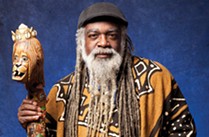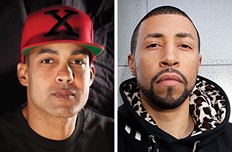We’ve all been there — walking through the produce section or sitting in a movie theater, when the quiet piano melody and stylings of not-quite-Sam Smith sneak up on you. They lead into a song that seems solely engineered for a maudlin and misty-eyed Vin Diesel to belt in honor of his late best friend, but Wiz Khalifa throttled it up the charts anyway.
The song in question, this spring’s inescapable “See You Again,” spent as many non-consecutive weeks at No. 1 as any other rap single in Billboard Hot 100 history. This towering feat, along with Mac Miller’s acclaimed major-label debut, might signify something of a high-water mark for Pittsburgh’s hip-hop reputation. But while 2015 has been the most successful year yet for the city’s two biggest rap stars, the conditions of the local hip-hop scene aren’t what they were when Wiz and Mac broke.
Ask most anyone involved in the local scene — from MCs to producers to hip-hop historians — and you get the sense that Pittsburgh is a fractured community with a significantly weaker rap infrastructure than five or six years ago when Khalifa and Miller really started to gain traction. The past few years look particularly brutal in hindsight, with the foremost venue for up-and-coming hip-hop performers closing its doors; a local, genre-based award show resting in dormancy; and the independent record label which took a chance on Khalifa and Miller casting its gaze over a wider, more national slate of artists.
But even if these institutions recharged back to where they were in 2008, discovering the next Pittsburgh rap breakout wouldn’t come overnight. As a city without a clear national music industry spotlight, much less a nationally recognized regional aesthetic, it can be more difficult for local artists to adopt a unified style, like a young rapper from Atlanta, New York or Chicago might. According to Paradise Gray, a hip-hop aficionado who witnessed the ’80s New York rap scene firsthand before relocating to Pittsburgh in 1992, the Pittsburgh sound exists — it’s just credited to another section of the country.
“People never really identified a Pittsburgh sound [because] that sound was co-opted to the West Coast,” Gray says. Sam Sneed, Mel-Man and Bud’da — a trio of producers with Steel City origins — had their fingerprints all over ’90s West Coast hip hop, with separate production credits on records by Dr. Dre, Snoop Dogg and Ice Cube, among others. Khalifa and Miller are the most prominent faces to emerge from Pittsburgh’s hip-hop scene, but Gray argues that these producers maintained just as much, if not more, influence on the genre’s history.
So when national media scrambled for “the next Mac Miller” or “the next Wiz Khalifa” following their breakouts, they were never going find a sound-alike, but simply another rap star from the same area code. Jasiri X, a progressive firebrand of an MC, seems to be next in line for a spotlight moment (at least according to City Paper readers), despite sounding completely unlike Khalifa or Miller. Although he’s tackling different thematic territory than either artist, he acknowledges the challenges of emerging in a saturated market. “It’s a more difficult landscape to get out of now than it was when Wiz and Mac got out. They were [some] of the first artists to blow out of the Internet,” Jasiri says.
But alongside Khalifa and Miller, Jasiri has been having a pretty great year in his own right, navigating a more unconventional path to success. Already known for some modestly popular viral music videos such as “What If the Tea Party Was Black?” and “I Am Troy Davis (T.R.O.Y.),” Jasiri — also a noted political activist — continued to build a national profile this year, earning some top artistic grants and awards. Over the past several months, he’s been announced as a recipient for the Ronald H. Brown Community Leadership Award, named a 2015-2016 Robert Rauschenberg Foundation Artist as Activist Fellow, a BMe Leader Fellow and the 2015 United States Artists (USA) Cummings Fellow for Music — and this doesn’t even include his latest album, Black Liberation Theology, which dropped on Black Friday. It’s taken years for Jasiri to arrive at the cusp of national recognition, but one of the most vital spaces where he began to hone his skills is no longer in operation.
East Liberty’s Shadow Lounge, which was co-owned by Justin Strong and Tim Guthrie, closed its doors in 2013. Serving as a hub for the city’s hip-hop talent, it provided an established platform for unproven rappers to refine their craft, along with booking national acts to which young MCs could aspire. According to Jasiri, there isn’t a reliable performance space like the Shadow Lounge for rappers anymore. “Where do you perform? You rap, you’re good. You want other people to hear you … where do you go? That was just this central place,” Jasiri says.
But perhaps the Shadow Lounge’s most useful function for up-and-coming rappers was the opportunity for workshopping, and for feeding off each other’s energy at weekly open-mic nights and occasional events like Rhyme Calisthenics, where Miller fleshed out his technical chops. For Ray Dawn, who made the 180-degree turn from law student to MC in 2008, finding a new venue to fill the Shadow Lounge’s void might be one of the most sensible remedies for Pittsburgh hip hop. “The most important thing for any artist is just having that place to perform. Bringing back a solid, weekly open mic for hip-hop acts would be dope,” Dawn says.
Aside from working toward a national career, local rappers used to have a smaller-scale milestone for which they could strive: the Pittsburgh Hip-Hop Awards. Founded in 2007 by Dwayne Muhammad, they were co-hosted by Paradise Gray and Melle Mel, of Grandmaster Flash and the Furious Five. The awards gave a young Khalifa, Miller and Jasiri something they could ascend to on a local level. But since Muhammad passed away in 2011, Gray thought it would be best to put the awards on hold for the foreseeable future.
Restoring the Pittsburgh Hip-Hop Awards or finding a spiritual successor to the Shadow Lounge might help to reunify the scene locally, but it wouldn’t necessarily build up the larger industry support system that helped Miller and Khalifa near the turn of the decade. Buoyed by the influence and business acumen of Rostrum Records, the city’s hip-hop poster boys were able to earn far more looks online outside of Pittsburgh than they would with self-released projects. As Khalifa and Miller continued to broaden their scope on national and international levels, Rostrum followed suit, extending its reach far beyond Pittsburgh and the genre of hip hop, while still sporting local mainstays like Boaz and pop band Donora.

Given the current lack of industry power-players currently in Pittsburgh, an artist could have plenty of talent or vision, but still need sound business minds to help guide a project. Akil Esoon, a producer and recording artist who recently heard a few of his own tracks featured on TV’s Empire, suggests that mentorship doesn’t just have to be a business transaction. “That’ll help the Pittsburgh landscape, too — having artists here based in Pittsburgh who have the experience within the hip-hop industry to push, nurture and mentor the younger artists coming up,” Esoon says.
Although large-scale success stories might be harder to come by, you get the sense that there’s no shortage of hip-hop talent in Pittsburgh — just a shortage of marketing power. Until the infrastructure finds its way back, local talent might rest on the brink of a wider spotlight. It remains unclear when the next Shadow Lounge or Rostrum Records might arise, but there’s a glimmer of hope for the resurgence of one local touchstone: Paradise Gray says that it might be time to bring back the Pittsburgh Hip-Hop Awards. After laying low for a few years, he plans to discuss a reboot of the Hip-Hop Awards over the next year. The Awards far from guarantee the rise of more breakout stars, but it’s a start — and it might just give the scene a vital jolt of optimism.
“I don’t think Pittsburgh has really had its golden era yet — not in disrespect to anything anybody’s done yet,” Gray says. “I think that Pittsburgh’s golden era’s going to launch a multitude of artists … Pittsburgh is not done yet when it comes to hip hop.”
A previous version of this story omitted Tim Guthrie as the co-owner of the Shadow Lounge.














